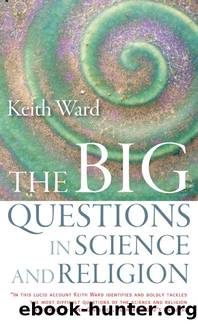The Big Questions in Science and Religion (None) by Keith Ward

Author:Keith Ward
Language: eng
Format: mobi, epub
Tags: Spiritual & Religion
ISBN: 9781599471624
Publisher: Templeton Press
Published: 2009-09-30T16:00:00+00:00
7. Is Science the Only Sure Path to Truth?
(CAN RELIGIOUS EXPERIENCE COUNT AS EVIDENCE?)
Religious Experience in the Semitic Traditions
In most religions, there is an important place for experience. In fact, if there were no distinctively religious experiences, it is doubtful if religions would exist.
Ninian Smart proposed a seven-dimensional analysis of religion (1997, 10â11). Most religions are distinctive in the experiences they favor and seek to sustain, in their myths or stories, in rituals, doctrines, ethical codes, social institutions, and material artifacts like temples or mosques. Different religions stress different dimensions, though most religions contain some elements in each dimension. Some religions do not place much emphasis on the occurrence of experiences and may even regard them with distrust if they lead to a questioning of orthodox beliefs. Yet it is rare to find the experiential dimension lacking entirely.
In Judaism, it is sometimes said that the most important dimension is that of keeping the Torah, or the moral and ritual tradition, and the cohesion of the community. Some Jews may be suspicious of undue introspection or of an exaggerated concern with oneâs own personal experiences. What matters is the community and the tradition.
Nevertheless, the community exists because it keeps the tradition and central to the tradition is belief that there is a creator God from whom the Torah derives and who, for the orthodox, gave the Torah to Moses. Moses is certainly said to have had distinctive visionary experiences. âThe angel of the Lord appeared to him in a flame of fire out of a bush; he looked, and the bush was blazing, yet it was not consumedâ (Ex. 3:2â3). God spoke to Moses out of the burning bush, and Moses hid his face, for he was afraid to look at God.
Many theophanies are recorded in the Hebrew Bible, and these are generally depicted as visions of a God who manifests and speaks. The content of revelation may consist of a set of laws (though it is not only that). But the laws are given through a prophet who sees and hears God. Whatever seeing and hearing amount to in these contexts, they seem to refer to direct apprehensions, analogous to or even mediated by means of sensory perceptions.
When personal experiences are distrusted in such traditions, it is because they may claim to contradict or supersede the original prophetic experience or because they may lead to an unhealthy concentration on some sort of emotionally powerful âpeak experienceâ to the detriment of social and ethical commitments.
The prophetâs vision of God and the prophetâs mediation of Godâs message are taken to be absolutely normative, and nothing that threatens them can be encouraged. The stress in religion tends to be on authoritative experience, which mediates knowledge of Godâs being and will in a form with which all other alleged experiences must be consistent. The point is, perhaps, that adequate experience of God requires the fulfillment of specific conditions in the experient. The experient (in this case, the prophet) must be mentally well balanced, wise,
Download
The Big Questions in Science and Religion (None) by Keith Ward.epub
This site does not store any files on its server. We only index and link to content provided by other sites. Please contact the content providers to delete copyright contents if any and email us, we'll remove relevant links or contents immediately.
A World Ablaze by Craig Harline(703)
Winning the War in Your Mind by Craig Groeschel(697)
White Too Long by Robert P. Jones(643)
In the Reign of King John by Dan Jones(639)
The Mission by David W. Brown(631)
History of the Church by Eusebius(612)
Beautiful Resistance: The Joy of Conviction in a Culture of Compromise by Jon Tyson(596)
No More Christian Nice Guy by Paul Coughlin(590)
A Spacious Life by Ashley Hales(568)
The Crusades: A History by Jonathan Riley-Smith(559)
Three Messiahs : The Historical Judas the Galilean, the Revelatory Christ Jesus, and the Mythical Jesus of Nazareth (9781450259477) by Unterbrink Daniel T(559)
The Black Church by Henry Louis Gates Jr(548)
The History of Palestine by John Kitto(515)
The Zionist Bible (BibleWorld) by Masalha Nur(512)
The Tale of the Tardy Oxcart (Swindoll Leadership Library) by Swindoll Charles R(507)
Why Study History? by John Fea(505)
Assassination of a Saint by Eisenbrandt Matt(488)
Descent Into Hell by Charles Williams(487)
The Cheese and the Worms: The Cosmos of a Sixteenth-Century Miller by Carlo Ginzburg(472)
